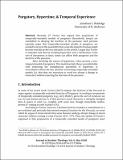Purgatory, hypertime, and temporal experience
Abstract
Recently, JT Turner has argued that proponents of temporally-extended models of purgatory (henceforth, temps) are committed to denying the doctrine of the parousia. Such persons typically argue that temporally-extended models of purgatory are needed to prevent the possibility that a morally imperfect human might become morally perfect too abruptly. In this article, I argue that Turner is mistaken and that by invoking hypertime and a clarification of the sort of abruptness at issue, temps can affirm both purgatory and the doctrine of the parousia. After clarifying the nature of hypertime, I then present a non-temporal model of purgatory. This model permits those uncomfortable with endorsing the metaphysical possibility of hypertime to nevertheless affirm the key intuition motivating temporally-extended models (i.e. that they are necessary to avoid too abrupt a change in character) without rejecting the doctrine of the parousia.
Citation
Rutledge , J C 2018 , ' Purgatory, hypertime, and temporal experience ' , Journal of Analytic Theology , vol. 6 , pp. 151-161 . https://doi.org/10.12978/jat.2018-6.0914-51172004a
Publication
Journal of Analytic Theology
Status
Peer reviewed
Type
Journal article
Rights
© 2018 Jonathan Rutledge and Journal of Analytic Theology. This article is published in a fully open access journal. This is the final published version of the work, which was originally published at https://doi.org/10.12978/jat.2018-6.0914-51172004a
Collections
Items in the St Andrews Research Repository are protected by copyright, with all rights reserved, unless otherwise indicated.

